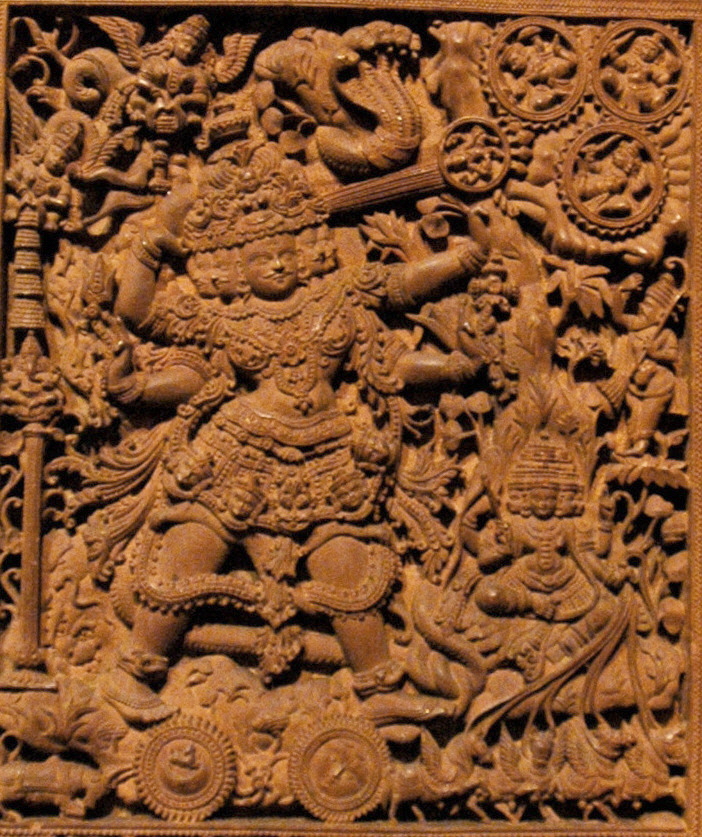శా|| దివిజక్ష్మా రుహ ధేను రత్న ఘనభూతి ప్రస్ఫురద్రత్నసా
DiviJakshmaRuha Dhenu Ratna GhanaBhooti PrasphuRadRathna Sa
నువు నీ విల్లు నిధీశ్వరుణ్డు సఖుఁ డర్ణోరాశికన్యావిభుం
nuvu Nee Villu; Nidheeshwarundu Sakhundu Arnoraasi Kanyaa Vibhun
డువిశేషార్చకుఁ డిఙ్క నీకెన ఘనుణ్డుం గల్గునే నీవు చూ
du VisheshaAarchakundu Inka Nee Kena GhanUndu Galugune? Neevu Choo
చి విచారిమ్పవు లేమి నెవ్వ~ణ్డుడుపున్ శ్రీ కాళహస్తీశ్వరా! || ౭ ||
chi Vicharimpavu; Lemi NevvaduUdupun? Sri Kalahastiswara || 7 |
DiviJakshmaRuha Dhenu Ratna GhanaBhooti PrasphuRadRathna Sa
నువు నీ విల్లు నిధీశ్వరుణ్డు సఖుఁ డర్ణోరాశికన్యావిభుం
nuvu Nee Villu; Nidheeshwarundu Sakhundu Arnoraasi Kanyaa Vibhun
డువిశేషార్చకుఁ డిఙ్క నీకెన ఘనుణ్డుం గల్గునే నీవు చూ
du VisheshaAarchakundu Inka Nee Kena GhanUndu Galugune? Neevu Choo
చి విచారిమ్పవు లేమి నెవ్వ~ణ్డుడుపున్ శ్రీ కాళహస్తీశ్వరా! || ౭ ||
chi Vicharimpavu; Lemi NevvaduUdupun? Sri Kalahastiswara || 7 |
- దివిజక్ష్మారుహ :- DiviJakshmaRuha : క్ష్మారుహము=Tree; దివిజక్ష్మారుహము=Kalpa Vrukshamu, Tree of Wealth and Prosperity
- ధేను :- Dhenu so ధేనువు=కామధేనువు; Kamadhenu or Surabhi, A Divine Bovine-Goddess that emerged from the churning of the Ocean of Milk and described as the miraculous "Cow of Plenty", that provides her owner whatever is desired.
- రత్న :- Rathna : రత్నము=Precious Stone, here it's referred as చింతామణి, a wish fulfilling magical jewel which manifests whatever wished for bestowing prosperity upon it's owner.
- ఘనభూతి :- GhanaBhooti ఘన = Greatness, భూతి = Wealth, prosperity and super human power
- ప్రస్ఫు :- Prasphu : ప్రస్ఫుటము = Blown, Blosson, Thrive or Expanded
- రత్నసానువు :- RathnaSaanavu : సానువు = A even or level ground on the top or edge of a mountain; రత్నాసనవు = Here it's referred to as Mount Meru, a jeweled fabulous mountain (decorated with Kalpavriksha, Kamadhenu, Chintamani) in the navel or center of the earth consisting of cities of Gods and celestial spirits.
- విల్లు :- Villu : విల్లు = Bow, in this context, Lord Shiva as Tripurantaka made Mount Meru as his Bow, Vasuki the Serpant is the bow string, Lord Vishnu as the arrow, Lord Agni became the tip of the arrow, Lord Vayu was inside the feathers on rear of the arrow, Earth became the chariot and Lord Brahma was the charioteer, and the Sun and the Moon were the wheels of the Chariot. See image of Lord Tripurantaka below.
- నిథీశ్వరుండు :- NidheEshwaRundu : Lord of Wealth, Lord Kubera.
- సఖుడు :- Sakhudu : Friend
- అర్ణోరాశి :- ArnoRaashi : అర్ణవం=Ocean, రాశి=Gem. Here referred to the Goddess of Fortune and Wealth, Sri Lakshmi who is one of the 14 Gems that emerged from the churning of the ocean of milk.
- కన్యావిభుండు:- KanyaVibhundu : కన్య=Maiden; విభుండు=Ruler or Master. కన్యావిభుండు=Lord Vishnu; One who accepted Goddess Lakshmi who emerged from the ocean of milk, as His eternal consort.
- విశేషార్చకుడు :- VisheshaArchakundu : విశేష = Special, Extraordinary or Eminent అర్చకుడు = An officiating Priest
- ఘనుండుం :- Ghanundu : Having Greatness, Fame, Glory, Nobility, Respectability and Opulent in every sense.
- గల్గునే? :- Galgune? : Here questioning the living or existence.
- నీవుచూచి :- నీవు = Neevu : You చూచి = choochi : To notice or see
- విచారణ = Thought, investigation, examination, consultation, discussion, disputation, reasoning.
- లేమినెవ్వడుడుపున్ :- LemiNevvaduUduPun : లేమి = Nullity, not being, absence, want or poverty ; యెవ్వడు = Who ; ఉడుపు = To efface, to turn out, to do away with, to wipe away or remove.
 |
| Five Headed Tripurantaka |
Wish fulfilling tree Kalpavriksha
Divine Goddess Kamadhenu
Magical stone Chintamani
all adorned on Mount Meru
which you made Your Bow
Lord Kubera is Your Friend
Consort of Goddess Lakshmi is Your Eminent Priest
Who else is Opulent with such Greatness, Fame and Glory?
Divine Goddess Kamadhenu
Magical stone Chintamani
all adorned on Mount Meru
which you made Your Bow
Lord Kubera is Your Friend
Consort of Goddess Lakshmi is Your Eminent Priest
Who else is Opulent with such Greatness, Fame and Glory?
and You ignore this plight, Alas!
Who else is to wipe away
Nullity, Indigence and Hardships?
This poem makes the reader ponder whose plight and indigence are being referred and who is in need of a savior to nullify their hardships, is it the poet or the Lord?
If the reference is to the hardships of the poet, then the poet could be expressing his frustration to the Lord for owing great riches and treasures and yet being oblivious to poet's pleas in spite of being His ardent devotee.
On the other hand if the reference is to the plight of the Lord, then He is already surrounded by various opulent elements that can bring prosperity and wealth, and at all times served by various Gods and Demi-Gods. Yet, some of His possessions include Ashes (Bhasma), Matted Hair (Jatin), Elephant Skin (Kari Charmam), Serpants (Naag), a Trident (Trishul), a Drum (Damaru), an Axe (Parashu) and Rosary Beads (Rudraksha).
The poet is expressing a subtle mockery at all the glory surrounding the Lord and yet He in need of a savior that will bring Him some wealth and prosperity.
An important take away from this poem is the transcendental and aesthetic life of the Omniscient depicting himself as a Yogi, who is totally absorbed in Himself and not unattached to the surrounding pompous, glory and fame.
Lord Dakshinamurthy, in his Yoga Mudra, teaches us in silence, the oneness of one's innermost self (atman) with the ultimate reality (brahman).
|| divijakṣmā ruha dhenu ratna ghanabhūti prasphuradratnasā
nuvu nī villu nidhīśvaruṇḍu sakhuṃ ḍarṇorāśikanyāvibhuṃ
ḍuviśeṣārcakuṃ ḍiṅka nīkena ghanuṇḍuṃ galgune nīvu cū
ci vicārimpavu lemi nevvaṇḍuḍupun śrī kāḷahastīśvarā! || 7 |
ci vicārimpavu lemi nevvaṇḍuḍupun śrī kāḷahastīśvarā! || 7 |
శా|| దివిజక్ష్మా రుహ ధేను రత్న ఘనభూతి ప్రస్ఫురద్రత్నసా
నువు నీ విల్లు నిధీశ్వరుండు సఖుఁ డర్ణోరాశికన్యావిభుం
డువిశేషార్చకుఁ డింక నీకెన ఘనుండుం గల్గునే నీవు చూ
చి విచారింపవు లేమి నెవ్వఁడుడుపున్ శ్రీ కాళహస్తీశ్వరా! || 7 ||
నువు నీ విల్లు నిధీశ్వరుండు సఖుఁ డర్ణోరాశికన్యావిభుం
డువిశేషార్చకుఁ డింక నీకెన ఘనుండుం గల్గునే నీవు చూ
చి విచారింపవు లేమి నెవ్వఁడుడుపున్ శ్రీ కాళహస్తీశ్వరా! || 7 ||



No comments:
Post a Comment